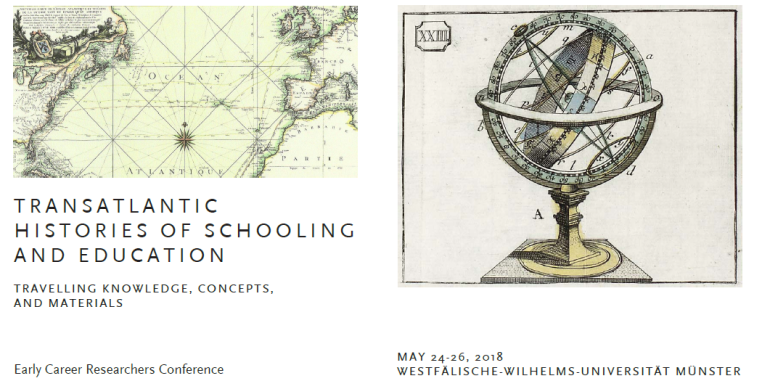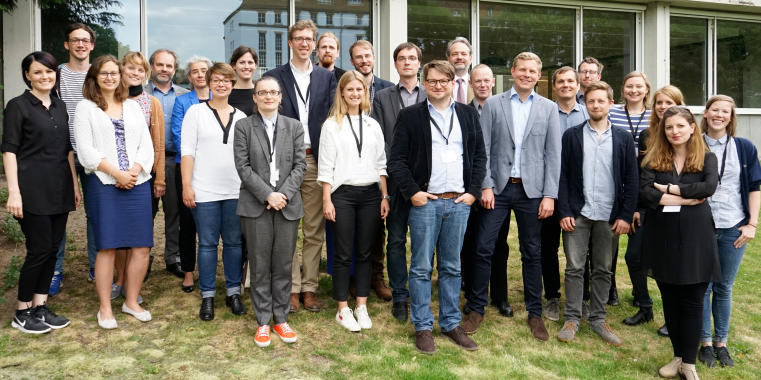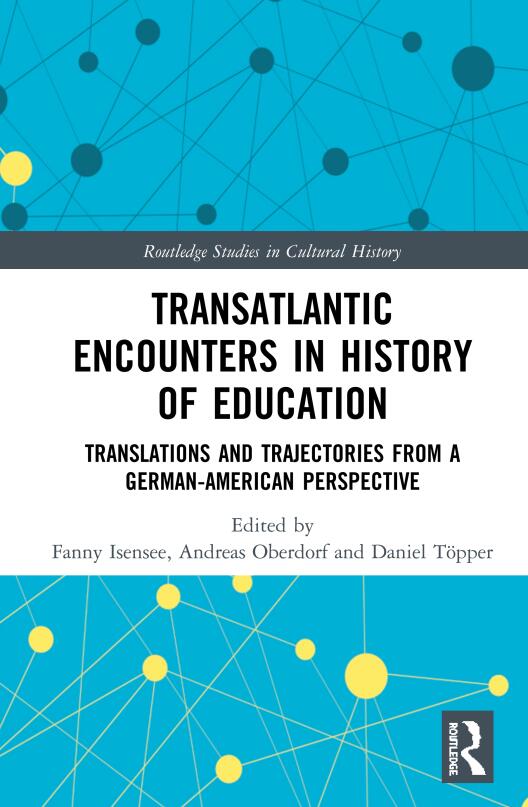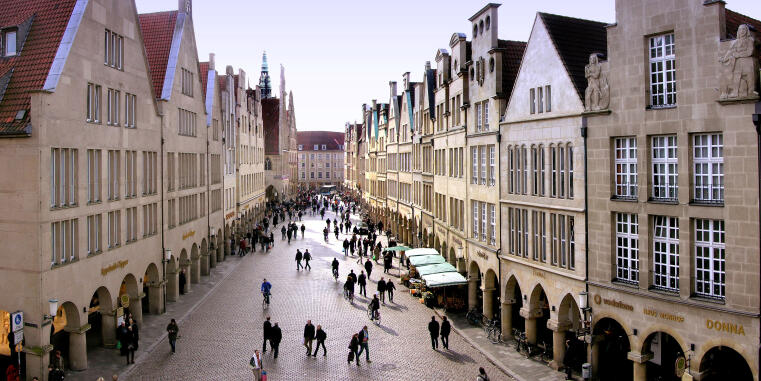

This conference was hosted by the Center for German-American Educational History, University of MÞnster (WWU) in cooperation with Humboldt University Berlin, funded by the History of Education Division of the German Educational Research Association (GERA), the German Academic Exchange Service (DAAD), the Sparkasse MÞnsterland Ost, the International Office of the WWU and the AmerikaHaus NRW e.V. in Cologne.


About the Conference
The exploration of cross-border processes regarding the production, diffusion and reception of pedagogical knowledge, concepts, and materials related to schooling and education has emerged as an integral part of the History of Education. Here, different approaches and concepts are employed that stem from investigations of international and transnational developments and relations and are closely linked to the formation of nation states in the 19th century. Thus, the conference, which will be held from May 24-26, 2018 in MÞnster, Germany, focuses on two aspects: (1) the spaces of exchange between Germany and the USA, which will be explored by bringing together current research concepts, approaches, and results, (2) the materiality of transnational processes, which will be investigated by focusing on its influence on subjects, objects, and modes of transfer.
First, since the 18th century, the transatlantic history of education has been predominantly influenced by German-American cultural exchange. Here, specific links, interactions, and influences between German and U.S. educators, scholars, schools, universities, scientific communities and academies, government agents and institutions can be observed on both sides of the Atlantic Ocean. Many pedagogical institutions are based on German models and the transnational relationships from which they resulted have sparked further exchange between these two regions â age-grading as a way of forming school classes is a particularly important example. These references were furthered by travel reports as well as the import of publications and materials. Hence, the conference seeks to analyze this paradigmatic and significant relationship by using current transfer research approaches to depict and link its patterns, processes, results, and scope.
The materiality of pedagogical objects and processes tied to these transatlantic interrelations forms the second focal point of the conference. Starting with German missionaries and ministers operating in colonial America, these transatlantic interactions were initially based on personal exchanges that eventually led to the transfer of pedagogical objects and institutions. In the 19th century, American students and professors travelled to German universities to seek inspiration for the introduction of research universities in the U.S. During this time, the first school-related model transfers took place, i.e. the introduction of compulsory schooling and the elementary school level, among other specific organizational principles. Moreover, textbooks, taxidermically prepared animals, and other educational materials found their way across the Atlantic Ocean. Although initially one-sided, starting in 1945 this dynamic shifted when U.S. re-education programs started to influence the education system of post-war Germany. In the framework of the conference, the object â idea, concept and model â that is transferred plays a significant role, since the conference centers around transfer and reception processes and their results.
Against this backdrop, the conference seeks to closely examine and discuss histories of transatlantic relationships in various education systems. It not only focuses on case studies, but also facilitates a setting where methodological approaches, as well as theoretical concepts and reflections, can be discussed. Here, ongoing research projects will serve as a medium to present and question both established and novel theoretical and methodological concepts and investigate the transferability and feasibility of perspectives offered by other academic disciplines. Apart from the presentation of papers, the conference provides opportunities for individual feedback, discussions and networking â both inside and outside the educational field.
Conference Program
(updated 25 May 2018)
May 24, 2018 |
|
| 11:00 a.m. â 1:00 p.m. | Registration |
| 1:00 â 2:30 p.m. |
Welcome and Opening Introduction Why should we study German-American Educational History? |
| 2:30 â 4:00 p.m. |
Session I Translating Prussian Schools: The Cousin Report in France, England, and America "The Past and Present State of Education, in the United States, and in Foreign Countries" â Foreign Education Systems in U.S. Educational Periodicals, 1830â1890 |
| 4:30 â 6:00 p.m. |
Keynote Speech Educational Multilateralism Revisited: Thoughts about a Global History of Education |
May 25, 2018 |
|
| 9:00 â 10:30 a.m. |
Session II But Can the Farm Travel? Agricultural Education and Networks of Agricultural Knowledge between Germany and the United States in the Late Nineteenth Century Germanic Influences on the School Camping movement in the United States, 1920â1950 |
| 11:00 a.m. â 12:00 p.m. |
Session III Die Rezeption hallescher PÃĪdagogik in der Kolonie Georgia Der hallesche Pastor Johann Christoph Kunze (1744â1807) und sein BemÞhen um eine in Nordamerika stationierte Predigerausbildung |
| 1:45 â 3:15 p.m. |
Session IV Deutsche StudierfÃĪhigkeitstests 'made in USA'. Zur Zirkulation und Transformation psychometrischen Wissens und Materialien zwischen der BRD und den USA (1960â1980) Die TragÃķdie der Prognose: deutsch-amerikanische BildungskrisenerzÃĪhlungen um 1870 und 1960 The Encyclopedia as "travelling object" â Monroe's "Cyclopedia of Education", its reception of German reference books and its influence on the formation of the academic field of education studies |
| 3:45 â 5:00 p.m. |
Session V "Transnational Chameleons" â An Alternative History of Teachers, Children and Developments of Professional Teacher Knowledge in European and U.S. Normal Schools Internationalisierung der Lehrer_innenbildung: Wissens- und Kulturtransfer durch das deutsch-amerikanische Fulbright-Stipendienprogramm fÞr Lehrer_innen (1952â1974) |
| 8:30 â 9:30 p.m. | "Evening Stroll - MÞnster at Night" |
MAY 26, 2018 |
|
| 9:00 â 9:45 a.m. |
Session VI BauhauspÃĪdagogik â Ein Beitrag zur deutsch-amerikanischen Bildungsgeschichte? Walter Gropiusâ und Joseph Hudnuts Ideen zur Umgestaltung der Architektenausbildung an der Graduate School of Design der Harvard University |
| 10:00 â 11:30 a.m. | Round Table Discussion |
| 11:30 â 11:45 a.m. | Concluding Remarks |

Organizing Committee:
Fanny Isensee, MA (Berlin)
Daniel TÃķpper, MA (Berlin)
Andreas Oberdorf, MED MA (MÞnster)
Contact:
Andreas Oberdorf


